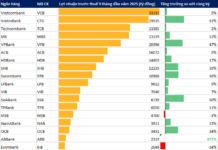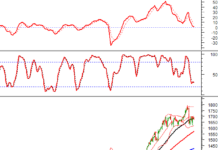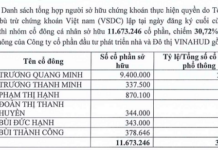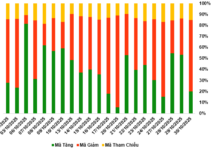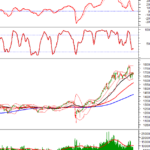
Mr. Bui Nguyen Anh Tuan, Deputy Director of the Domestic Market Management and Development Department: The domestic market is a pillar of macroeconomic stability and sustainable development – Photo: DMS
|
As part of the Autumn Fair 2025 held on the afternoon of October 28, the Domestic Market Management and Development Department (Ministry of Industry and Trade) organized the 2025 Domestic Trade Development Policy Forum.
In his opening remarks, Mr. Bui Nguyen Anh Tuan, Deputy Director of the Domestic Market Management and Development Department, emphasized that the domestic market is a pillar of macroeconomic stability and sustainable development. Amid global uncertainties, domestic demand serves as a “foundation” supporting Vietnam’s economic growth, ensuring social welfare, and bolstering consumer confidence.
According to Mr. Tuan, recognizing this role, the Party, National Assembly, and Government have issued several foundational resolutions, notably the “quadrilateral resolutions” 57, 59, 66, and 68, creating a legal framework for domestic market development. These resolutions promote innovation, international integration, legal improvements, and private sector growth.
Mr. Tuan noted that domestic trade should be viewed not just as a space for goods circulation but as an intrinsic driver of the economy. Based on this, the Ministry of Industry and Trade has identified four strategic directions.
First, developing green trade and logistics infrastructure. The Domestic Market Management and Development Department is collaborating with localities to upgrade traditional markets, making them modern and civilized while preserving cultural values. The “smart market” model, leveraging digital technology, will enhance transparency, connect buyers and sellers, and expand Vietnamese product consumption to remote areas. Concurrently, investments in green logistics centers, warehouses, and modern distribution systems will ensure efficient and environmentally friendly supply chains.
Second, building a national e-commerce platform integrating trading floors, payment systems, logistics, and traceability using blockchain, QR codes, and RFID technology. This initiative is crucial for ensuring transparency and safety for consumers while helping businesses optimize costs and enhance competitiveness.
Third, comprehensive digital transformation and innovation. The industry aims to create a digital transformation ecosystem for businesses, encouraging production facilities, cooperatives, and small enterprises to adopt technology in management, sales, and customer care. Smart retail models using AI, Big Data, and cashless payments are reshaping the domestic market.
Lastly, improving institutions, enhancing the business environment, and protecting consumer rights. Increased transparency and reduced administrative barriers will encourage business investment while promoting and safeguarding Vietnamese products in the domestic market.
Mr. Tuan affirmed that domestic trade drives production, creates jobs, and ensures social welfare. In the era of green consumption and circular economies, market development policies must be humane, eco-friendly, and transparent.
Building on this foundation, the Ministry of Industry and Trade is implementing major strategies, including domestic trade development to 2030 with a vision to 2045; retail market development to 2050; a consumer demand stimulation program for 2025–2027; and logistics and e-commerce development strategies for 2026–2030.
“This is a shared journey requiring unity from central to local levels, from management agencies to businesses and citizens,” Mr. Tuan emphasized.
Vietnam’s Retail Market: Vast Potential, Dynamic Transformation
According to Ms. Tran Thi Phuong Lan, Chairwoman of the Vietnam Retailers Association, the retail market is recovering strongly but operating in entirely new ways. Shifting consumer behavior demands comprehensive business innovation.
Thanks to stimulus policies and rising incomes, consumer confidence is strengthening. Vietnam now has over 1,200 supermarkets, 270 shopping centers, 250,000 convenience stores, and more than 7,500 outlets of FDI companies like Aeon, Lotte Mart, and Go Market. Modern retail accounts for over 40% of total sales and continues to grow rapidly, reflecting the development of civilized trade infrastructure.
Experts predict that from 2025 to 2030, Vietnam’s GDP could grow by about 8% annually, while total retail sales of goods and services may increase by over 12%, among the highest in the region. Vietnamese consumers are also becoming smarter and greener, with 74% willing to pay 20% more for eco-friendly products. “Vietnamese Use Vietnamese Goods” has become a natural choice for many consumers.
According to Ms. Lan, the retail market is at a pivotal transformation stage but faces challenges like intense competition, rising costs, weak logistics, and a lack of digital skills.
To adapt, businesses should focus on three key solutions: comprehensive digital transformation, developing multi-channel sales systems, applying AI for forecasting and personalized promotions, and improving operational efficiency.
Investing in logistics infrastructure and cold supply chains to meet demands for “fast shopping” and fresh food consumption.
Developing phygital stores that blend physical spaces with digital platforms to enhance interaction and customer retention.
Supporting SMEs in e-commerce participation, standardizing traceability, promoting digital payments, and using AI and Big Data to understand customer needs and predict consumption trends.
Additionally, green retail and circular economies are becoming essential, from reducing plastic and recycling products to partnering with eco-friendly suppliers. According to Ms. Lan, these actions not only benefit the community but also enhance brand value.
Alongside technology, human factors remain foundational. Businesses must train employees in digital skills, data analysis, and smart customer care to adapt to the new era.
 Ms. Tran Thi Phuong Lan, Chairwoman of the Vietnam Retailers Association: The retail market is recovering strongly but operating in entirely new ways – Photo: DMS
|
At the Forum, Ms. Lan proposed that the government continue improving the legal framework, simplifying procedures, and creating a favorable investment environment. She also called for policies encouraging trade infrastructure investment in remote areas, attracting FDI in logistics and e-commerce, and providing financial support and workforce training.
She also urged stronger e-commerce regulation to combat fraud and counterfeit goods, protect consumers, and establish reasonable technical barriers to support Vietnamese businesses in integration.
– 20:15 29/10/2025
Empowering Remote Cooperatives: Global Sales as a Digital Transformation Success Story
A recent survey by the Vietnam Cooperative Alliance revealed that the digital transformation rate among cooperatives nationwide stands at a mere 32%.
Resident Deposits in Credit Institutions Reach 8 Quadrillion Dong
Data from the State Bank of Vietnam reveals that, to date, resident deposits in credit institutions have reached approximately 8 quadrillion VND, marking a nearly 13% increase compared to the same period last year.
HDBank Surpasses 14,800 Billion VND in 9-Month Profit, Maintains Lead in Profitability, Dividends, and Bonus Shares Up to 30%
HDBank (HOSE: HDB) has reported a consolidated pre-tax profit of VND 14,803 billion for the first nine months of 2025, marking a 17% year-on-year growth. The bank continues to lead the industry in profitability metrics, boasting an impressive ROE of 25.2% and ROA of 2.1%, underscoring its operational efficiency and robust financial foundation.










